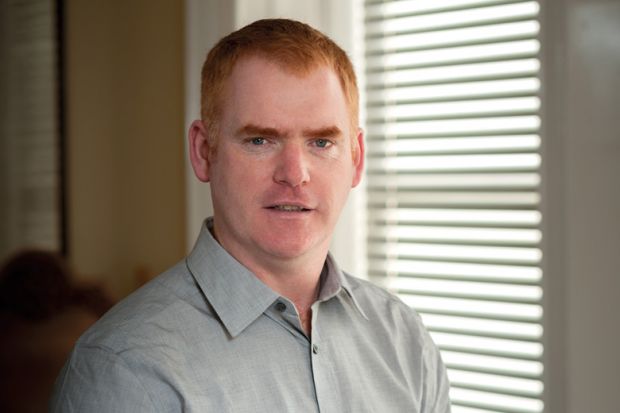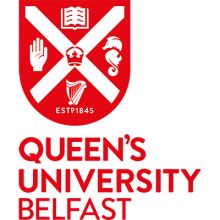Jack Anderson is a professor in the School of Law at Queen's University Belfast and a global expert in the study of match-fixing in sport. He has previously worked with Interpol, FIFA, the world football players’ union FIFPro, and World Rugby. He is the editor-in-chief of the International Sports Law Journal and is a member of a United Nations group on combating match-fixing in sport. In June, he was selected as one of the 24 arbitrators for the 2016 UEFA European Championship, where he is providing dispute resolution services.
Where and when were you born?
Limerick, Republic of Ireland, in 1974.
How has this shaped you?
Limerick is a sports-mad city, has a bit of a rough reputation, can appear a wee bit hostile at first but is consistently underestimated and, once you get to know it, it’s a humble, humorous place – but that’s enough about me.
“Dispute resolution services” sounds awfully complicated. What will you actually be doing?
If UEFA disciplines a player or a team at the Euros, that decision can be appealed to CAS [Court of Arbitration for Sport]. I might be one of the arbitrators on that CAS Panel.
We’ve already seen some contentious decisions during the tournament. Do you think that you will have your work cut out?
No, it is unlikely that CAS will be needed. One of the fundamentals of sports arbitration is that only in the rarest of circumstances ought “on-field” refereeing decisions be overturned by an “off-field” appeal. The referee should be the ultimate arbitrator. A more likely appeal might be, on account of violence by its fans, a team is expelled from the tournament and seeks to challenge that initial ruling by UEFA at CAS.
Match-fixing has blighted professional sport for a while. What, in your experience, has been the most egregious case of it, in any sport?
In 2005, there was a huge scandal in German football that centred on the corrupt activities of a referee called Robert Hoyzer. It was really the first time that the extent and reach of organised crime’s involvement in football match-fixing was revealed. The amount of money involved, the ease with which the conspiracy was arranged and the fact that it remained undetected for months in a leading league in Europe, came as a big shock to the football industry.
How clean do you think sport is from scandal?
In terms of doping, the latest research suggests that in some elite sport about one in three athletes may be doping, although fewer than 1-2 per cent test positive for performance-enhancing substances. In terms of match-fixing, the latest research suggests that winnings from illegal betting on “fixed” sporting events could represent up to €6.8 billion (£5.39 billion) annually for organised crime entities. If that figure is correct, then the winnings on “fixed” sporting events is the third-largest source of illicit crime proceeds globally behind narcotics and counterfeiting. The will and resources needed to clean up sport are consistently underestimated.
Have you ever had a eureka moment?
I was about to embark on a master's dissertation on a pretty esoteric area of international law when I saw a headline in a local newspaper about a conviction for an assault on a sports field. Having played the sport in question, I knew the victim (personally) and the perpetrator (by reputation). The report sparked an interest in sports law. The area of international law I sought to study remains abstruse, and rightly so.
What is the worst thing someone has said about your academic work?
I once got a succinct review that said: “The author’s work is little more than sports journalism and not very good punditry at that.” The second half of the review hurt a lot more than the first (see below).
If you weren’t an academic, what do you think you’d be doing?
A sports journalist, although my School’s research committee think I am already (see above).
What has changed most in higher education in the past 10 years?
The correlation between increased levels of managerialism and poor syntax. In a recent university marketing blurb, I read about “a greater commitment to market-attuned courses and students”.
What advice would you give to your younger self?
Drink less. Be more confident. Move to Australia. Stop making lists.
What is the best thing about your job?
I still get a kick on seeing my byline on a publication but the greatest buzz I get from my job is teaching a small group of committed, engaged students in a class with a coffee machine nearby.
What’s your biggest regret?
I started a medical degree in 1991 and left it, ahem, prematurely, or immaturely as my parents put it. I always wanted to work in emergency medicine and regretted wasting my parents’ money, although I am sure that the Irish health system is glad not to have had to underwrite my clinical negligence bills.
What advice do you give to your students?
Be resilient; persevere; get out when you can and experience the world – on Erasmus, on a gap year, whatever. Also, don’t listen to an academic giving you careers advice.
If you were the UK higher education minister for a day, what policy would you introduce?
I would make it mandatory for all in the sector to buy and read Times Higher Education. I would then ban the National Student Survey (NSS) and research excellence framework (REF) and the use of acronyms in all higher education meetings.
Appointments
Sheila Rowan has been appointed Scotland’s next chief scientific adviser. Professor Rowan, who took up her position on 13 June, is director of the Institute for Gravitational Research at the University of Glasgow. Research carried out by the institute was part of a global effort leading to the discovery of gravitational waves, one of the most significant scientific discoveries of this century, with the international team involved being awarded the 2016 Special Breakthrough Prize in Fundamental Physics. “This is an exciting time to join the Scottish government and I’m looking forward to working with ministers and officials to show the added value that science advice can bring to their work,” she said.
Keith Ridgway, founder and executive chair of the University of Sheffield’s Advanced Manufacturing Research Centre, has been appointed executive chairman of the Advanced Forming Research Centre at the University of Strathclyde. Professor Ridgway will work directly with Strathclyde’s principal and dean of engineering to lead a new manufacturing strategy. He will retain a leadership role at Sheffield, deepening and developing the alliance between the two institutions.
The University College of Estate Management – a provider of supported online learning for built environment professionals – has announced two new appointments to its board of trustees. Andrew Hynard, UK deputy chairman of JLL, the financial and professional services firm specialising in real estate services and investment management, and Stephen Jackson, associate director (international) at the Quality Assurance Agency, bring more than 50 years’ experience in the property and education industries. Additionally, David Mason, lead student representative for UCEM, has become the first student trustee to join the board.
Rachel Sandby-Thomas has been appointed the University of Warwick’s next registrar. She will join Warwick before the start of the new academic year.
POSTSCRIPT:
Print headline: HE & me
Register to continue
Why register?
- Registration is free and only takes a moment
- Once registered, you can read 3 articles a month
- Sign up for our newsletter
Subscribe
Or subscribe for unlimited access to:
- Unlimited access to news, views, insights & reviews
- Digital editions
- Digital access to THE’s university and college rankings analysis
Already registered or a current subscriber? Login










